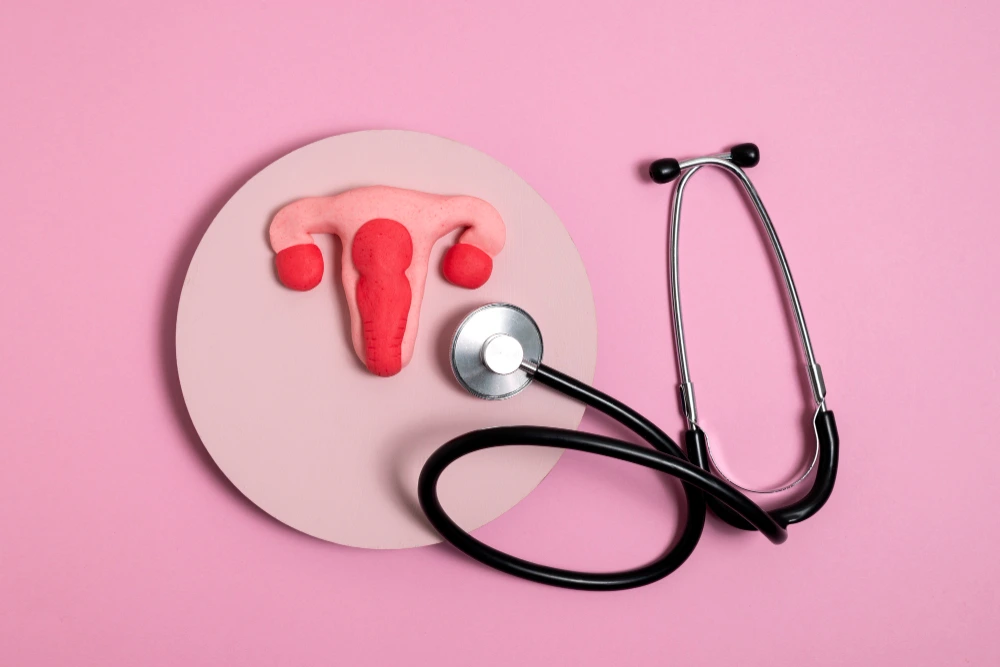Many women who want to have children find that the terms endometriosis and infertility are almost always linked to them. Even though endometriosis is mainly associated with painful periods, it leads to other issues as well. This condition leads to infertility for many women since it affects 30-50% of them. Exactly how does this issue affect a person’s ability to conceive? Let’s find out more about the link, the reasons behind it, and what you can do to address it.
Suggest to read :- Light Bleeding After 14 Days of IUI: What Does It Mean?
What Is Endometriosis?
In endometriosis, the tissue that is like the uterus lining (endometrium) grows in places other than the uterus, for example, on the ovaries, fallopian tubes, pelvic lining, or intestines. Once a month, the tissue thickens and bleeds as the menstrual cycle happens, but unlike the uterine lining, it cannot leave the body. Consequently, the injured area gets inflamed, scarred, and experiences pain.
However, it’s not only pain that matters — all of this chaos can also harm your ability to have children.
How Does Endometriosis Cause Infertility?
This section explains the principal methods through which endometriosis may keep you from becoming pregnant.
Blocked or Damaged Fallopian Tubes
The main way endometriosis interferes with fertility is by stopping the sperm and eggs from reaching each other due to blocked fallopian tubes. Scar tissue or cysts may form in the fallopian tubes and block them so that the sperm does not get to the egg or the fertilized egg does not get to the uterus.
Ovarian Damage
Endometriosis can result in ovarian cysts called endometriomas that not only harm the ovarian tissues but also have a negative impact on eggs and ovulation. When your eggs are not healthy, having a natural pregnancy becomes unlikely.
Disrupted Ovulation
Endometriosis can cause hormones to be out of balance and inflammation in the area, which may prevent or interrupt the release of eggs.
Impaired Egg-Sperm Interaction
Sometimes, endometriosis can disturb the pelvic environment even if the fallopian tubes are open. This could reduce the sperm’s ability to move or turn the area against fertilization.
Uterine Lining Issues
A few women with endometriosis end up with a uterine lining that is not normal, so the fertilized egg may not implant properly. As a result, the woman might have a miscarriage early on or not get pregnant even after fertilization.
Immune System Dysfunction
There are problems with the immune system in people with endometriosis. As a result, the body may treat sperm or embryos as threats and lower the possibility of them embedding successfully.
Does the Stage of Endometriosis Matter in Fertility?
But sometimes, the process is not simple. It is classified into four groups (I to IV) depending on the size, depth, and site where the lesions and adhesions are.
- Even though endometriosis is only mild to moderate, these women have a hard time getting pregnant due to inflammation and problems with hormones.
- Those with advanced stages of endometriosis can find their fallopian tubes blocked or the pelvis stuck together.
At the same time, a person with more severe symptoms may not have reduced fertility. Some women experiencing only a little disease may have trouble with infertility, but others with serious diseases can become pregnant.
How Is Endometriosis-Related Infertility Diagnosed?
Usually, the process of diagnosis includes
- During a pelvic exam, the doctor checks for cysts or scarring that could be present.
- A scan with ultrasound or MRI is done to spot endometriomas or large lesions.
- A minor surgery called laparoscopy is the best method to detect and measure how much endometriosis is present.
For those women who have trouble getting pregnant, testing hormones and monitoring ovulation is essential.
Treatment Options for Endometriosis-Related Infertility
It is good to know that, thanks to current treatments, many women with endometriosis can conceive after making a plan.
Medication Management
GnRH agonists, birth control pills, and progestins work to suppress endometriosis only for a short period. Still, these aren’t the best choices when you are working on getting pregnant.
Surgery (Laparoscopic Excision or Ablation)
When the disease is moderate or severe, having the tissue and adhesions removed can help improve a woman’s chances of conceiving. Surgery cures pain and restores the functions of the reproductive system.
Assisted Reproductive Techniques (ART)
You can try the following options when natural conception doesn’t work:
- IUI is most suitable for people with mild issues and open fallopian tubes.
- When a woman has blocked fallopian tubes or ovarian problems, IVF is very successful.
Egg Freezing or Embryo Freezing
When you’re not trying to have children now but have endometriosis, freezing your eggs or embryos is a good idea before your condition worsens or surgery is required.
Can You Get Pregnant Naturally with Endometriosis?
Unassisted conception is possible for women suffering from endometriosis. It is vital to find out about the disease early, treat it promptly, and keep monitoring the patient. Eating well, exercising, and handling stress are examples of things that may support your path to having a baby.
Final Thoughts
This condition does not have to stop you from becoming a parent. It does create some difficulties, but it does not prevent a person from reaching their goals. Many women with the right medical help can both get pregnant and have healthy pregnancies.
We focus on giving every woman personalized fertility care since each woman is different. If you think endometriosis is causing fertility problems, our group of experts will assist you with caring diagnosis and practical advice.



